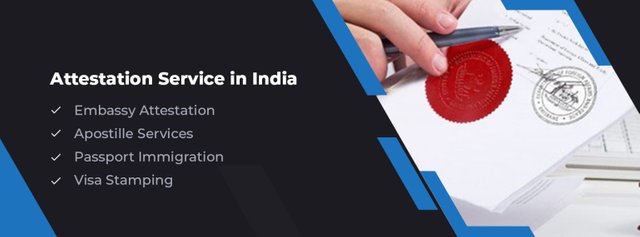
Introduction
Certificate attestation in India is a vital process that ensures the authenticity and validity of various documents, making them legally acceptable abroad. Whether you're planning to study overseas, work in a foreign country, or engage in international business, understanding the intricacies of certificate attestation is crucial. In this comprehensive guide, we will delve into the world of certificate attestation in India, covering its importance, types of documents, and the step-by-step process.
Why Certificate Attestation in India Matters
Certificate attestation serves several essential purposes:
• International Recognition: Attested documents gain international recognition and acceptance, ensuring they are legally valid in foreign countries.
• Authentication: It verifies the genuineness of documents, reducing the risk of fraud or misrepresentation.
• Legal Compliance: Many countries and organizations require attested documents for various purposes, such as visa applications, employment, or education.
Types of Documents That Require Attestation
Certificate attestation in India is applicable to a wide range of documents, including:
- Educational Documents:
o School Certificates
o College Degrees
o Diplomas
o Mark Sheets - Personal Documents:
o Birth Certificates
o Marriage Certificates
o Death Certificates
o Divorce Decrees - Commercial Documents:
o Power of Attorney
o Certificates of Incorporation
o Trade Licenses
o Memorandum of Association
The Certificate Attestation Process in India
The certificate attestation process in India involves several steps:
- Notary Attestation: Begin by getting your documents notarized by a local notary public. This step ensures the authenticity of the documents.
- Home Department Attestation: After notary attestation, submit your documents to the Home Department or the respective state government department for attestation.
- MEA Attestation: Once the state government attestation is complete, send your documents to the Ministry of External Affairs (MEA) for attestation. This step is crucial for international acceptance.
- Embassy Attestation: Depending on the destination country, you may need to get your documents attested at the embassy or consulate of that country in India.
- MOFA Attestation: For documents intended for use in countries that are not part of the Hague Convention, you may need to get them attested by the Ministry of Foreign Affairs (MOFA) of the destination country.
Conclusion
Certificate attestation in India is an indispensable process for individuals and businesses seeking to navigate the complex world of international interactions. By ensuring the authenticity and legality of your documents, attestation opens doors to a plethora of opportunities, from studying abroad to working overseas and conducting international business.
In a globalized world, where cross-border activities are the norm, certificate attestation provides the necessary validation for your documents to be recognized internationally. It is a crucial step that enhances trust and credibility, reducing the risk of legal issues or complications in foreign countries.
So, whether you're a student aspiring to study abroad, a professional exploring international career opportunities, or a business owner expanding your horizons, understanding and completing the certificate attestation process in India is essential.
For further guidance and assistance, consult with reputable attestation services or contact the relevant government authorities to ensure a seamless and successful attestation journey. Embrace the world of international possibilities with attested documents and make your global aspirations a reality.